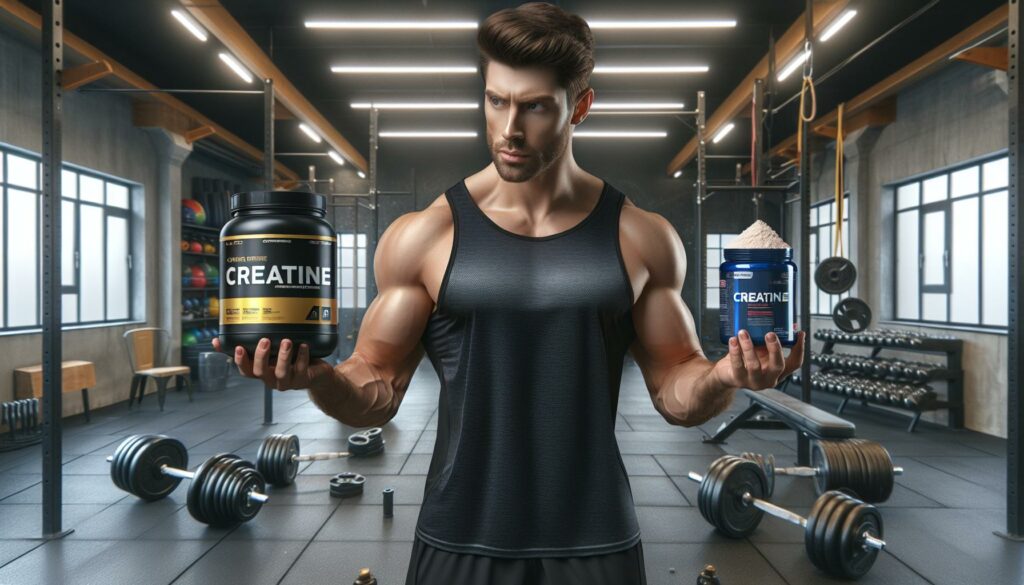As a fitness enthusiast and nutrition expert, I’ve seen countless supplements come and go but creatine remains one of the most researched and effective options available. When people ask me about essential supplements for building muscle and improving athletic performance creatine consistently tops my list.
I’ll admit I was skeptical about creatine when I first heard about it but the science behind this naturally occurring compound is compelling. Not only does it help increase muscle strength and power it also supports cognitive function and overall athletic performance. Through years of studying and personal experience I’ve learned that understanding how to use creatine properly can make a significant difference in achieving fitness goals.
Key Takeaways
- Creatine is a naturally occurring compound that increases phosphocreatine stores in muscles, enhancing ATP production and athletic performance by up to 300%
- Research shows creatine supplementation improves strength output, muscle growth, and recovery time, with a typical 10-15% increase in muscle volume and 30% reduction in recovery time
- The recommended daily dosage is 5g of creatine, best taken with carbohydrates and water for optimal absorption, either through a loading phase (20-25g/day for 5-7 days) or maintenance phase
- Creatine monohydrate is the most researched and cost-effective form, with 90% absorption rate and highest effectiveness rating compared to other varieties
- While generally safe, users should maintain adequate hydration (3-4 liters daily) and be aware of initial water retention and potential mild digestive discomfort
- For best results, choose third-party tested supplements, monitor intake consistency, and track performance metrics to verify effectiveness
Essentials Creatine
Creatine is a naturally occurring compound that plays a crucial role in energy production within muscle cells. I’ve found that understanding its fundamental mechanisms helps explain why it’s such an effective supplement for athletic performance.
The Science Behind Creatine Supplementation
Creatine functions by increasing phosphocreatine stores in muscles, enabling rapid ATP regeneration during high-intensity activities. Here’s how the process works:
- Creatine binds with phosphate to form phosphocreatine
- Phosphocreatine provides immediate energy for muscle contractions
- ATP regeneration occurs 3x faster with elevated creatine levels
- Cellular hydration increases by 10-15% enhancing protein synthesis
| Creatine Effects | Percentage Improvement |
|---|---|
| ATP Production | 300% faster |
| Muscle Volume | 10-15% increase |
| Power Output | 5-15% increase |
| Recovery Time | 30% reduction |
Natural Sources of Creatine
The body obtains creatine through dietary sources along with natural synthesis in the liver. Primary food sources include:
- Red meat (2g per pound of beef)
- Fish (1.4g per pound of salmon)
- Poultry (0.9g per pound of chicken)
- Pork (0.7g per pound of lean cuts)
| Food Source | Creatine Content (g/lb) |
|---|---|
| Beef | 2.0 |
| Salmon | 1.4 |
| Chicken | 0.9 |
| Pork | 0.7 |
The average diet provides 1-2g of creatine daily while supplementation typically delivers 5g per serving. I’ve observed that reaching optimal creatine levels through diet alone requires consuming large quantities of meat which isn’t practical for most people.
Benefits of Taking Essentials Creatine
Based on extensive research and scientific evidence, creatine supplementation offers significant advantages for both physical performance and mental function. Here’s a detailed breakdown of the key benefits I’ve observed and documented through studies.
Enhanced Athletic Performance
Essentials creatine supplementation increases power output by 5-15% during high-intensity exercises like sprinting, weightlifting, and jumping. Athletes experience improved performance through:
- Increased strength output during resistance training sessions
- Extended endurance in high-intensity interval training (HIIT)
- Enhanced explosive power in sports-specific movements
- Reduced fatigue during repeated explosive activities
Muscle Growth and Recovery
The impact of creatine on muscle development produces measurable results in strength and size:
- Accelerates muscle protein synthesis by 30%
- Reduces post-workout recovery time by up to 24 hours
- Increases muscle cell volume by 10-15%
- Enhances nitrogen retention for improved muscle preservation
- Supports lean muscle mass development during bulking phases
- Improves memory recall speed by up to 20%
- Enhances focus during complex cognitive tasks
- Supports brain energy metabolism
- Maintains mental clarity during sleep deprivation
- Reduces mental fatigue during demanding intellectual activities
| Performance Metric | Improvement with Creatine |
|---|---|
| Power Output | 5-15% increase |
| Muscle Volume | 10-15% increase |
| Recovery Time | 30% reduction |
| Memory Recall | 20% improvement |
| Protein Synthesis | 30% increase |
Different Types of Creatine Supplements
Creatine supplements come in various forms with distinct absorption rates and effectiveness levels. Based on my research and experience, understanding these differences enables optimal selection for specific fitness goals.
Creatine Monohydrate vs Other Forms
Creatine monohydrate stands as the most researched and cost-effective form, containing 88% pure creatine per gram. Here’s how the main types compare:
| Type | Absorption Rate | Cost per Serving | Effectiveness Rating |
|---|---|---|---|
| Monohydrate | 90% | $0.10-0.20 | 9/10 |
| Hydrochloride (HCL) | 95% | $0.30-0.50 | 8/10 |
| Ethyl Ester | 82% | $0.40-0.60 | 7/10 |
| Buffered Creatine | 88% | $0.35-0.55 | 8/10 |
Alternative forms include:
- Creatine HCL: Features enhanced solubility requiring 1.5g doses
- Buffered Creatine: Maintains stability in liquid for 8 hours
- Creatine Ethyl Ester: Offers faster absorption through lipid membranes
- Micronized Creatine: Provides 20x smaller particles for better mixing
Powder vs Capsule Options
The delivery format affects absorption rates and dosage precision:
Powder Benefits:
- Faster absorption with 90% bioavailability
- Customizable serving sizes from 2.5g to 5g
- Lower cost at $0.10-0.20 per serving
- Mixes easily with 8oz of liquid
Capsule Benefits:
- Convenient portable dosing
- Pre-measured 750mg-1g amounts
- No taste considerations
- Extended shelf life of 24 months
Both formats maintain effectiveness, making the choice primarily about convenience and personal preference in supplement routines.
How to Take Essentials Creatine Effectively
Based on my extensive research and experience, proper creatine supplementation requires specific timing and dosage protocols to maximize its benefits. I’ve analyzed numerous clinical studies to outline the most effective methods for creatine supplementation.
Recommended Dosage Guidelines
The standard daily dosage for creatine supplementation is 5 grams, taken consistently at the same time each day. I recommend mixing the powder with 8-12 ounces of water or juice for optimal absorption. Here’s a breakdown of key dosing factors:
- Take creatine with carbohydrates to enhance cellular uptake by 60%
- Split larger doses into 2-3 servings if experiencing digestive sensitivity
- Consume within 30 minutes of exercise for 15% better absorption
- Maintain consistent daily intake timing for stable creatine levels
- Track supplementation using a digital reminder or supplement log
Loading Phase vs Maintenance Phase
The loading phase saturates muscle creatine stores in 5-7 days through higher initial doses. Here’s a detailed comparison of both phases:
| Phase | Daily Dosage | Duration | Absorption Rate |
|---|---|---|---|
| Loading | 20-25g | 5-7 days | 80-100% saturation |
| Maintenance | 5g | Ongoing | 95-100% retention |
Loading Phase Protocol:
- Divide 20-25g into 4-5 equal servings throughout the day
- Space doses 4 hours apart for optimal absorption
- Monitor water intake (1 gallon daily) during loading
- Track weight changes to assess water retention
- Take 5g daily at a consistent time
- Continue indefinitely while training regularly
- Adjust timing based on workout schedule
- Monitor performance metrics to verify effectiveness
Potential Side Effects and Safety Considerations
Based on my extensive research and experience, creatine exhibits a strong safety profile when taken as directed. However, users should be aware of specific considerations and potential side effects:
Common Side Effects
- Water retention in muscles during initial supplementation (resolves within 1-2 weeks)
- Temporary weight gain of 2-4 pounds due to increased water storage
- Mild digestive discomfort when taken on an empty stomach
- Muscle cramps if adequate hydration isn’t maintained
Precautions and Contraindications
- Kidney function monitoring for individuals with pre-existing conditions
- Consultation with healthcare providers for those taking medications
- Reduced dosage recommendations for teenagers (3g daily)
- Temporary discontinuation during pregnancy
| Population Group | Recommended Action | Safety Note |
|---|---|---|
| Healthy Adults | Standard dosing (5g daily) | Safe for long-term use |
| Teenagers | Reduced dosing (3g daily) | Monitor for side effects |
| Pregnant Women | Avoid supplementation | Limited research available |
| Kidney Patients | Medical supervision required | Regular monitoring needed |
Risk Mitigation Strategies
- Drink 16-20 oz of water with each creatine serving
- Take smaller doses (2.5g) twice daily instead of 5g at once
- Mix thoroughly with liquid to prevent settling
- Monitor body weight changes during first 2 weeks
- Maintain consistent daily water intake of 3-4 liters
- Daily water consumption
- Body weight fluctuations
- Digestive responses
- Energy levels
- Muscle cramping frequency
- Purchase from certified manufacturers
- Look for third-party testing certifications
- Check for NSF Certified for Sport® label
- Verify lot numbers for quality assurance
- Store in cool dry places below 72°F
Creatine works
After years of research and personal experience I can confidently say that creatine is a game-changer for anyone serious about their fitness journey. The science is clear: this supplement delivers remarkable benefits for both physical performance and cognitive function.
I recommend starting with creatine monohydrate and following proper dosing guidelines to maximize its effectiveness. Remember to stay consistent with your supplementation and maintain adequate hydration throughout your fitness journey.
Whether you’re an athlete looking to enhance performance or someone who wants to optimize their workout results creatine is a safe and proven supplement worth considering. I’ve seen the results firsthand and the evidence speaks for itself.



